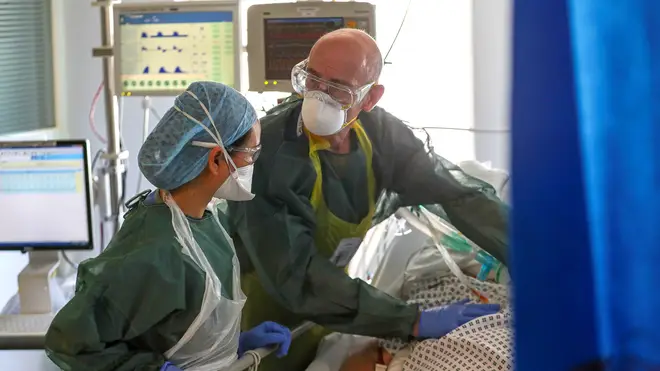
Lewis Goodall 10am - 12pm
29 December 2020, 19:20

Critical care patients in London could be transferred to Yorkshire due to overcapacity, according to a report in the Health Service Journal.
Senior sources in intensive care have told the journal that requests have been made to move patients away from the capital due to rising hospitalisation figures, the HSJ has said.
The publication added that it had seen leaked data that revealed Intensive Care Units (ICUs) in some parts of the city, the South East of England and the East are running at over 100 per cent capacity.
It comes after the UK recorded a further 53,135 new cases of coronavirus on Tuesday, the largest daily rise since the pandemic began.
On the eve of Britain's lockdown review, Prime Minister Boris Johnson is facing growing pressure to tighten up restrictions and possibly plunge the country into a third national lockdown to curb rising transmissions.
Read more: UK records over 50,000 daily cases for first time in pandemic
Read more: Covid patients 'piling up at door' as hospitals risk being overwhelmed

'The time has come to make everywhere Tier 4,' says GP
Although requests to move patients were reportedly made in recent days, it is not yet clear whether any transfers from London to Yorkshire have been made or will be in the next few days.
An image showing an internal NHS critical care capacity dashboard, published by the HSJ, reveals the capital's critical care capacity is currently at 114.2 per cent, with more than three in five of those due to Covid-19.
The South East is at 113.4 per cent, with more than 60 per cent of those due to the virus, while the East of England is running at over 100 per cent, according to the picture.
South West England currently has the most space, running at around two-thirds of its capacity, and only three in ten of those due to Covid.
Read more: London's Nightingale hospital 'on standby' despite staffing worries
Read more: 'Back in eye of storm': Covid patients in hospital pass April peak

Another national lockdown 'is avoidable', says Shadow Business Minister
In response, an NHS spokesperson told LBC: “The NHS has tried and tested plans in place to manage significant pressure, either from high Covid-19 infection rates or non-Covid winter demands, and this has always included mutual aid practices whereby hospitals work together to manage admissions.
“While the NHS is opening more beds in places like London to care for the most unwell patients, it is vital that people continue to follow government guidance and do everything possible to reduce transmission of the virus.”
The president of the Intensive Care Society also told HSJ that NHS England needs to do more to focus the “full force of NHS resources” on Covid-19 care which could mean cancelling all routine operations that require intensive care beds.
Meanwhile, the number of coronavirus patients in London's hospitals is now higher than the levels recorded at the peak of the first wave of the pandemic.
There were 5,371 hospital patients confirmed as having Covid as of 8am on 29 December, according to the latest figures from NHS England.
During the first wave, the number of patients in the city peaked at 5,201 on 9 April.

Maajid Nawaz: Covid tunnel vision risks creating problems we're unprepared for
Elsewhere, four more of the seven NHS regions in England are also reporting a record number of Covid-19 hospital patients: Eastern England, the Midlands, the South East and the South West.
The other two regions, the North East and the North West, remain below peak levels that were set in mid-November.
It comes as doctors across the country warn that NHS hospitals are becoming overwhelmed.
Mr Johnson is chairing a meeting on Tuesday night to decide on which tiers regions should be placed in, with any changes due to be announced in Parliament on Wednesday.
More areas are expected to be placed in tougher restrictions, as cases rise in all regions of England.
Listen & subscribe: Global Player | Apple Podcasts | Google Podcasts | Spotify